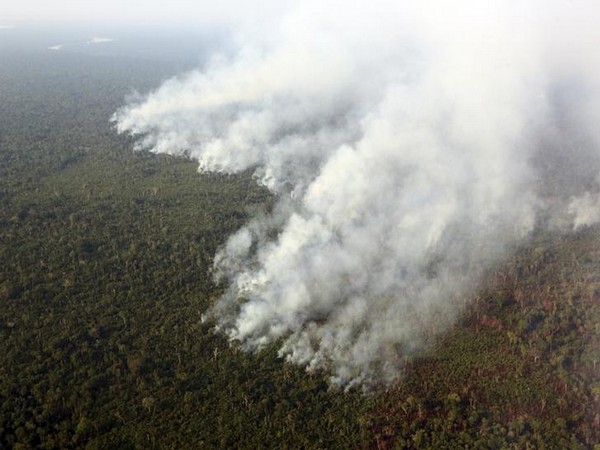As Brazil's wetlands burned, government did little to help
That same day, the Mato Grosso state firefighters corps said the count of navy and agents was only 60, and there was just one plane. During the five days AP journalists traveled the Pantanal this month, they didn't see a single member of Brazil's armed forces..

- Country:
- Brazil
After hours navigating Brazil's Pantanal wetlands in search of jaguars earlier this month, Daniel Moura beached his boat to survey the fire damage. In every direction, he saw only devastation. No wildlife, and no support from federal authorities. “We used to see jaguars here all the time; I once saw 16 jaguars in a single day,” Moura, a guide who owns an eco-tourism outfit, said on the riverbank in the Encontro das Aguas state park, which this year saw 84% of its vegetation destroyed.
“Where are all those animals now?” The world's largest tropical wetlands, the Pantanal is popular for viewing the furtive felines, along with caiman, capybara and more. This year it is exceptionally dry and burning at a record rate. The fires have been so intense that at one point smoke reached Sao Paulo, 900 miles away. President Jair Bolsonaro's government says it has mobilized hundreds of federal agents and military service members to douse the flames.
However, all along the only highway through the northern Pantanal, dozens of people — firefighters, ranchers, tour guides and veterinarians — told The Associated Press the government has exaggerated its response and there are few federal boots on the ground. What little concrete assistance has come mostly from planes dropping water from above, locals said, but that only happened after great delay and mainly targeted private ranches rather than protected areas. Making matters worse, several aircraft remained grounded at the start of the inferno.
“I can't see much federal help; it is basically us here,” said Felipe Augusto Dias, executive director of SOS Pantanal, an environmental group. Both sides of the Trans-Pantanal highway — an area that should feature pools of water, even in its dry season — was parched. As of Sunday, nearly a quarter of the Pantanal — an area more than the size of Maryland — had been consumed by fire, according to satellite imagery from the Federal University of Rio de Janeiro.
Pantanal vegetation can regenerate quickly with rain, but the wildlife that survive are left stranded without habitat. Along that scorched landscape were injured and disoriented animals, plus charred corpses of others. On the river, Moura motored past a dead 6-foot-long anaconda, tangled on a fallen tree branch. A fawn, lost and alone amid burned shrubs, eyed the boat. The sky was an apocalyptic orange.
Pantanal fires began burning wildly in July and continued into September. The number of fires so far this year — more than 17,000 — exceeds the 12-month totals for every year on record, stretching back to 1998, and is triple the annual average, according to data from the government's space agency, which uses satellites to count the blazes. Fires, whether intentionally set or the result of lightning strikes, can easily spiral out of control in the dry season. A Federal Police investigation indicates fires to clear pastures at four ranches spread across 25,000 hectares (almost 100 square miles), detective Alan Givigi said. The wildfire burned preservation areas and a national park.
Addressing the United Nations General Assembly last week, Bolsonaro said Brazil has been targeted by a disinformation campaign, and compared the Pantanal's vulnerability to that of California — without noting that this year's Pantanal wildfires have destroyed an area more than twice the size of California's blazes. “Large fires are the inevitable consequences of high local temperature in addition to the accumulation of decomposing organic matter,” he said in his pre-recorded message.
With government agents largely absent, firefighters and volunteers carved firebreaks and used buckets and hoses to battle walls of flames. Along a dirt road off the Trans-Pantanal, a man carrying a basin of water ran from his improvised water truck to a stretch of burning vegetation. It had little effect as wind redirected the flames toward a tree, causing it to explode as though it had been soaked with gasoline. “The wind changed direction,” Divino Humberto said dejectedly. “It (the fire) is going into the forest.” Brazil's defense ministry told the AP that numbers vary day to day, but on Sept. 14, the navy had 172 service members in the Pantanal in Mato Grosso, along with 139 federal agents and 11 aircraft. That same day, the Mato Grosso state firefighters corps said the count of navy and agents was only 60, and there was just one plane.
During the five days AP journalists traveled the Pantanal this month, they didn't see a single member of Brazil's armed forces.
(This story has not been edited by Devdiscourse staff and is auto-generated from a syndicated feed.)
ALSO READ
US investigators interview ship personnel in Maryland bridge collapse
Key Republican says US should help fund Maryland bridge replacement
US Domestic News Roundup: Five high school students wounded in Maryland shooting; Man dies after setting self on fire outside New York court where Trump trial underway and more










